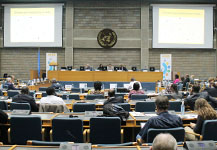A high-level event on follow-up and review of the 2030 Agenda for Sustainable Development focused on strategies for engagement on natural resources, land and soil.
The event was organized by the Institute for Advanced Sustainability Studies (IASS) in collaboration with the UN Human Settlements Programme (UN-Habitat), the UN Environment Programme (UNEP), Landesa, the Global Land Indicators Initiative (GLII) and the Global Land Tool Network (GLTN), with support from the German Federal Ministry for Food and Agriculture.
 2 November 2015: A high-level event on follow-up and review of the 2030 Agenda for Sustainable Development focused on strategies for engagement on natural resources, land and soil. The event was organized by the Institute for Advanced Sustainability Studies (IASS) in collaboration with the UN Human Settlements Programme (UN-Habitat), the UN Environment Programme (UNEP), Landesa, the Global Land Indicators Initiative (GLII) and the Global Land Tool Network (GLTN), with support from the German Federal Ministry for Food and Agriculture.
2 November 2015: A high-level event on follow-up and review of the 2030 Agenda for Sustainable Development focused on strategies for engagement on natural resources, land and soil. The event was organized by the Institute for Advanced Sustainability Studies (IASS) in collaboration with the UN Human Settlements Programme (UN-Habitat), the UN Environment Programme (UNEP), Landesa, the Global Land Indicators Initiative (GLII) and the Global Land Tool Network (GLTN), with support from the German Federal Ministry for Food and Agriculture.
The event took place at GLTN’s Sixth Partners Meeting, in Nairobi, Kenya, on 2 November 2015. Ivonne Lobos Alva, IASS, facilitated the event.
In opening remarks, Joan Clos, Executive Director, UN-Habitat, highlighted land’s links to development, power imbalances and conflict, and its role in the context of urbanization. On follow-up and review, Clos described the need to think about facts and figures, measureable targets and actions, and to work with local authorities. Alexander Müller, IASS, called for identifying next steps for immediate action toward the Sustainable Development Goals (SDGs), and for innovative, integrated approaches and new alliances to ensure “some SDGs are not achieved at the expense of others.” He favored thematic SDG reviews of natural resources, land and soils at the national scale and global reviews, under the umbrella of the High-Level Political Forum (HLPF) in 2016 or 2017.
In a keynote address, Macharia Kamau, Permanent Representative of Kenya to the UN, described the significant achievement of negotiating and agreeing upon the SDGs. He said it required an innovative shift toward working with a range of stakeholders to ensure consensus in a global agreement. On land, Kamau: stressed the need to protect gains already made; said the SDGs are interconnected and “networked,” with land as a cross-cutting issue; and stressed that prosperity remains fundamental in sustainable development, and this is related to land tenure and land management. Kamau said the monitoring and review framework will be crucial in providing credibility and validity to the 2030 Agenda, highlighting the role of indicators and financing.
Delegates raised questions around: land implications for rights to access infrastructure and resources and the need to address land issues beyond its soil and physical properties; how to ensure the Global South is not marginalized and has the resources for implementation; youth’s role in achieving the SDGs; a shift from official development assistance (ODA) to innovative approaches for finance mobilization and investment; the African Union’s Agenda 2063; the need to use a network approach, as opposed to putting land at the center, thereby avoiding fragmentation and unintended consequences; and recognition of the work needed in developed countries to do things differently.
The event also included two interactive panel discussions, on: From the setting of global goals to country-level implementation, setting thematic foci and strategies for collaboration; and What role will the UN system, governments, civil society and others play in the review of the 2030 Agenda?
The event concluded with five high-level messages: the start of the implementation of the 2030 Agenda needs to be done in a new, innovative way, requiring a shift in mindset and drawing on integrated approaches, coalitions, alliances and networks; national-level multi-stakeholder and rights-holder processes are key for follow-up and review mechanisms, and there is a need to facilitate a “level playing field,” in particular to include meaningful participation of civil society; thematic reviews on natural resources, land and soil can support follow-up and review, but more work is needed to define how this will be done; integrated approaches require support from national governments and civil society in the North and South and the multilateral system; and to support integrated, participatory and inclusive implementation of the 2030 Agenda, national reviews need to be linked to the global level. [IISD RS Meeting Coverage] [IASS Meeting Webpage] [Concept Note]